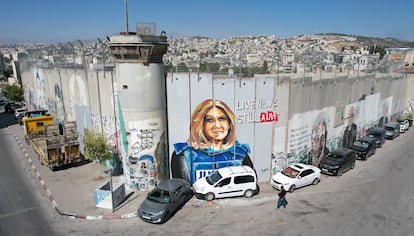The unpunished deaths of other civilians question Israel’s willingness to clarify the attack on WCK
The unfulfilled promises to conduct ‘thorough’ investigations into similar killings include the case of American activist Rachel Corrie and British filmmaker James Miller in 2003


Rachel Corrie was 23 when a huge Caterpillar D9R military excavator rammed her in Rafah, in southern Gaza, on March 16, 2003, crushing her with its shovel, according to numerous witnesses. The driver then reversed and ran over her again. She was still breathing when she said, “I think my back is broken.” Corrie, who was trying to stop the bulldozer from destroying a Palestinian home, was an American citizen. So was one of the seven aid workers from the disaster relief group World Central Kitchen (WCK) who died on Monday when Israel attacked their convoy with three missiles, according to the newspaper Haaretz. Israel’s Prime Minister Benjamin Netanyahu has defined it as an “unintentional mistake” whose circumstances he has promised to clarify with a “thorough” investigation.
That same adjective, “thorough,” was used in 2003 by the then Israeli prime minister, Ariel Sharon, when he promised President George W. Bush that his country would investigate Corrie’s death. More than 20 years later, no one has been held accountable for the young American activist’s death.
In August 2012, an Israeli court cleared the bulldozer driver and the country’s military of any responsibility for the death. When the young woman’s parents later filed a civil lawsuit in Israel, another court blamed the victim for her own death, stating that she had caused what it called “an accident.” Washington then limited itself to pointing out that the Israeli investigation had not been satisfactory. The American company Caterpillar continued to provide excavators like the one that killed the young woman to the Israeli army. In 2012, Amnesty International highlighted that the death of Corrie, a civilian clearly identified as such — she was wearing a fluorescent orange vest — at the hands of the Israeli military, demonstrated the “constant impunity” surrounding crimes committed by that country’s army against civilians.
This and other precedents make human rights activists fear that the deaths of WCK workers will also go unpunished. “We don’t know what will happen, but, in general terms, we fear that the investigation will end with exoneration [of those responsible],” says Sarit Michaeli, head of international advocacy for the Israeli human rights organization B’Tselem. This activist points out that based on her organization’s experience, even in the rare cases in which there is accountability for the deaths of civilians at the hands of the military, it occurs at a “very low level.” It affects whoever pulls the trigger or fires the drone, and “never at the high levels of those who decide, for example, how Israel has to use its firepower in Gaza.”
Other cases from the past underpin that concern. On May 2, 2003, 34-year-old British filmmaker James Miller was shot dead by an Israeli sniper in the Rafah refugee camp while filming a documentary with the prophetic name “Death in Gaza.” A London police study determined that the bullet in the neck that killed him was the same type used by the Israeli army. The British Prosecutor’s Office called for the soldier who fired the shot to be prosecuted. Israel ignored that request.
Shortly before, on April 11, 2003, another British activist, 21-year-old Tom Hurndall, was shot in the head when he was trying to protect some children in Rafah from a soldier’s gunfire. The Israeli investigation, also on this occasion, blamed the victim for his own death, which it called an “accident.” Investigators said that the young man acted as a “human shield” for Palestinian militants.
In this case, the sniper was sentenced to eight and a half years in prison, of which he served six and a half. At the trial, the soldier argued that the Israeli army had a policy of shooting unarmed civilians. The Hurndall family has not been able to clarify whether this soldier, a Palestinian with Israeli citizenship, was obeying orders.
Gap between image and reality
“The Hurndall family’s quest for an impartial investigation shows clearly the gap that exists between the image of investigations portrayed by the Israel Defense Forces’ public relations unit and the reality,” said a 2005 report by Human Rights Watch (HRW) titled “Promoting impunity.”
HRW obtained an English-language copy of the investigation summary. More than half of the 22-page document was devoted to statistics regarding Palestinian attacks, tunnels used for smuggling, and criticisms of the International Solidarity Movement, the organization of which the young man was a member. The arguments were similar to those deployed by Israel during the current war in Gaza to justify attacks on civilians.
The rights group concluded that “incidents in which Israeli forces have killed Westerners are investigated more frequently than the deaths of Palestinian civilians. This is partly because the Israel Defense Forces (IDF) and Israeli government are highly sensitive to the media impact of such killings. It is also because the victims’ families have greater access to financial, media, and technical resources. But even investigations into the deaths of prominent foreign victims show clearly how the IDF’s delays, equivocation, and lack of transparency result in investigations that fall badly short of the ‘effective remedy’ required by international law.”
More recently, in 2022, Israel shelved the investigation into the death in Jenin (West Bank) of Palestinian-American Al Jazeera journalist Shireen Abu Akleh, calling it a “mistake.” The Israeli authorities only recognized that their military were behind the death once the videos and investigations by the United Nations and the United States had demonstrated it unequivocally. The soldier who killed the journalist with a bullet to the head has not been tried. Israel had previously attributed the shooting to Palestinian militants.
“What differentiates the case of the seven WCK workers killed on Monday,” emphasizes the B’Tselem official, is that “it’s not about Palestinians.” When an Israeli soldier kills a foreign civilian, “there is a little more media scrutiny, and Israel’s willingness to acknowledge a mistake, whereas with ordinary Palestinians in Gaza, the fact that they, or their mothers, are murdered only results in Israel defining them as terrorists.”
Data from another Israeli human rights group, Yesh Din, confirms that when an Israeli soldier or civilian kills a Palestinian, it is often not even investigated. In December 2022, only 11 incidents, representing 4.4% of the 248 investigations into attacks on Palestinians and their property between 2017 and 2021, resulted in the opening of legal proceedings.
On the rare occasions in which an Israeli soldier or settler is tried for killing or wounding a Palestinian, the sentences are extremely light, denounces Yesh Din.
In 2016, B’Tselem released a video in which a soldier was seen shooting a Palestinian in the head who was already lying wounded and motionless on the ground, after he had allegedly tried to stab another soldier earlier. The soldier who pulled the trigger had not been charged, but those images went viral and led to his arrest and prosecution. He only spent nine months in prison. When he was released, dozens of people welcomed him as a hero.
Sign up for our weekly newsletter to get more English-language news coverage from EL PAÍS USA Edition
Tu suscripción se está usando en otro dispositivo
¿Quieres añadir otro usuario a tu suscripción?
Si continúas leyendo en este dispositivo, no se podrá leer en el otro.
FlechaTu suscripción se está usando en otro dispositivo y solo puedes acceder a EL PAÍS desde un dispositivo a la vez.
Si quieres compartir tu cuenta, cambia tu suscripción a la modalidad Premium, así podrás añadir otro usuario. Cada uno accederá con su propia cuenta de email, lo que os permitirá personalizar vuestra experiencia en EL PAÍS.
¿Tienes una suscripción de empresa? Accede aquí para contratar más cuentas.
En el caso de no saber quién está usando tu cuenta, te recomendamos cambiar tu contraseña aquí.
Si decides continuar compartiendo tu cuenta, este mensaje se mostrará en tu dispositivo y en el de la otra persona que está usando tu cuenta de forma indefinida, afectando a tu experiencia de lectura. Puedes consultar aquí los términos y condiciones de la suscripción digital.








































